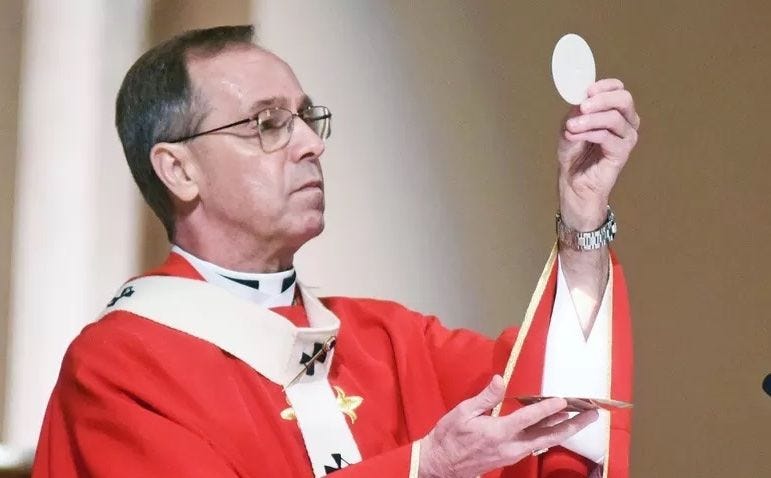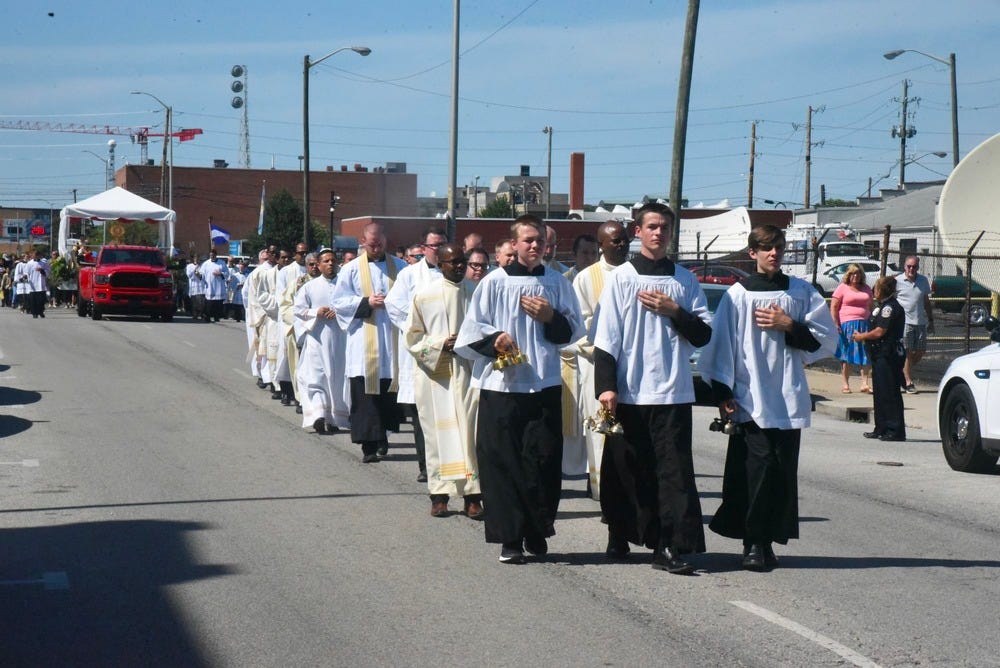
Indy archbishop prepares for Eucharistic Congress
“I hope this will help to draw us to greater unity, in the Eucharist, as a Church.”

The Archbishop of Indianapolis said this month that when a crowd of Catholics gathers in his city to adore the Eucharist, the event may well have long-lasting fruit for the diocese he leads.
Archbishop Charles Thompson told The Pillar that he hopes the USCCB’s “Eucharistic Revival” initiative will become a source of unity for the Church across the United States, especially as bishops have lamented division and polarization along political fault lines in the Church.
“Regardless of whether you fall left-of-center, right-of-center, wherever you fall, hopefully we can all agree that sacraments serve as the core to our teachings, our beliefs, our identity as Catholics — and that the Eucharist is the source and summit of everything,” Thompson told The Pillar.
“Hopefully, there’s none of us on any side of the coin who can’t agree to that. That’s who we are.”
The archbishop talked with The Pillar as his archdiocese prepares to host the 2024 National Eucharistic Congress, which will culminate the Eucharistic Revival, a three-year project which launched a diocesan level in June.
The Eucharistic congress will take place over several days, with Masses, catechetical sessions, and periods of Eucharistic adoration. USCCB officials have said attendance could top 100,000. Indianapolis was chosen to host the event because of its central national location, convention infrastructure, and relatively low booking costs, organizers have said.
Start your day with Starting Seven - a daily news roundup in your inbox.
The choice of a host city has had an impact on the local archdiocese in Indiana.
Thompson told The Pillar that he’s still learning what practical work his archdiocese will need to do to prepare.
“We haven’t had a Eucharistic congress [in the U.S.] since 1976 in Philadelphia. And I think the one before that was in Chicago in the 1950s. So I’m on the bishops’ advisory committee for the Eucharistic congress, and there are some great minds at work on this. But because we haven’t done this in a while, some things we’re kind of developing as we go.”
“But in the archdiocese, we’ve hosted other national events here. We have hosted the NCYC since 2011, and we’ve had the bishops’ conference here, liturgical conferences, and the Canon Law Society of America,” Thompson said.
“As we get closer, we’ll find out more and more about what elements we’re going to be responsible for. We expect - if it’s anything like NCYC - that things will ramp up as we get close. We know it will require a lot of volunteers, and a lot of parishes and the pastoral center will be trying to provide volunteers, and also help setting up for Mass and other things.”
“You know, if we’re going to have Mass in Lucas Oil Stadium or in the convention center, we’ll likely be bringing in altars and ambos and chairs and crucifixes and tabernacles, and all of those things,” the archbishop added.
“And, then, you know, the coordinating of different kinds of housing, different places for gathering, that will involve having local people on the ground here. So I can’t yet name all the things we’ll be doing, but we’ll be involved, and we expect there will be a lot of work, but the local people are excited about that.”
Thompson said that as Catholics from across the U.S. come to Indianapolis, he hopes that local parishes gain a deeper sense of their place in a universal Church.
“I hope this will help to draw us to greater unity, in the Eucharist, as a Church — our unity with each other as an archdiocese, but also with the universal Church, throughout the United States and in the universal Church. I hope that we have a deeper appreciation of that unity, and that we grow in a deeper sense of living out the joy of the Gospel.”
“You know, there are great, wonderful, devout Catholics here, in various dimensions. We’re spread out, though, through 39 counties, almost 14,000 square miles — we have 126 parishes, 67 Catholic schools, two seminaries, Catholic universities and Catholic healthcare facilities. We’ve got all this great stuff, and then some — And can we bring that together with a more unified sense of who we are as Catholics here, and with a greater sense of purpose and meaning? A sense of being many parts but one body?”

Thompson said he believes the Eucharistic Revival can do more than unify its host diocese — the archbishop said he thinks the project can more broadly sow unity in a Church that has experienced in sharp division - even over the prospect of the revival itself.
Since it was announced last year, bishops have expressed concern about both the focus and the prospective cost of a Eucharistic congress- which some estimates have pegged as high as $28 million. While organizer Bishop Andrew Cozzens has said donors have begun pledging major commitments, some bishops, including Archbishop Timothy Broglio of the Archdiocese of the Military Services, have blanched at the prospective cost.
And there has been some discussion among bishops about how exactly Eucharistic theology will be presented, with some urging an emphasis on the Mass, and the community which flows from it, and others focusing on Eucharistic adoration and other devotional practices.
For his part, Thompson said the focus of a Eucharistic Revival should not exclude charity. The archbishop pointed out that the Eucharist is often called the sacrament of charity - and that a focus on charity can be a unifying approach.
“The Eucharist is not an object, you know, it’s a person. And in the Mass, it’s an event. It’s personal, and I think that’s important to remember. And I think if we keep that focus intentionally, and we keep connecting the Eucharist to the daily lived experience of our faith, and our call to holiness and mission, that's important to all of us.”
The archbishop explained that when his diocese kicked off its own phase of the Eucharistic Revival, it coupled a Eucharistic procession with organized works of mercy for the poor.
“We started our Corpus Christi procession at the cathedral and ended up at St. John’s Church downtown, and both of them have major outreaches to the poor. And we did that intentionally. We had two Masses at the cathedral - one in English and one in Spanish - and we had a mission project going on at the parish center across the street, so that whichever Mass you were at, when you weren’t at Mass, you were doing some mission project that was going to go out to the poor and needy.”
“We were making sure we were tying what we were doing — the adoration, the process, the Mass, with outreach to those in need. And I think we’ll see some of that in the congress, with different talks, and different presentations, and with mission projects, so that the message of charity and the Eucharist is being very much carried throughout the whole congress experience.”
As Thompson prepares to host the 2024 Eucharistic congress, he might do so from a more central position in the entire Eucharistic Revival. The archbishop was nominated by U.S. bishops as a candidate to chair the USCCB’s evangelization and catechesis committee, which launched the Eucharistic Revival project. Elections will take place next month.
The archbishop said “the only reason I can imagine I was nominated” is that the Eucharistic congress will be in his hometown. Thompson told The Pillar he’s glad to pitch in if elected, but emphasized that he didn’t seek out the position, and will be busy with preparing for the congress regardless of his obligations to the USCCB’s committee.
Also nominated was Bishop William Byrne of Springfield, Massachusetts, who was not available for an interview.
But Thompson did talk with The Pillar about his sense of evangelization and catechesis in the life of the Church.
“When you ask about evangelization, I think about a talk that now-Cardinal [Raniero] Cantalamessa gave at the U.S. bishops’ retreat at Mundelein in January 2019.”
“He said that bishops have two primary responsibilities — that of evangelization and that of catechesis. And he said that sometimes the mistake we tend to make is to put catechesis ahead of evangelization — to think that if we teach the tenets of the faith, that somehow, they’ll become believers. And he said it’s got to be the other way around. First evangelization. First we have to bring people to a personal encounter with Jesus Christ.”
“And it's only in that personal account of having heard the kerygma, the passion, death and resurrection of Jesus Christ, the Kingdom of God — the Gospel, in its fullness, and then in that relationship that they're now ready for catechesis, and ready to learn and embrace the tenets of the faith.”
“So first is evangelization. The first thing we have to do is proclaim that good news of the Gospel of Jesus Christ.”
Bishops have administrative responsibilities, Thompson acknowledged, and often spend more time in meetings than in preaching.
“But I think of my episcopal motto - ‘Christ, the Cornerstone.’ For me, that’s a reminder to keep Christ at the center, and to keep Christ at the foundation. So whether I’m in an administrative meeting, or I’m doing a confirmation, or I’m going to a U.S. bishops’ meeting, or I’m going out to Catholic Charities, it all has to be Christ-centered. So at the core of it has to be staying rooted in prayer — in Word and sacrament.”
On catechesis, the bishop said that “evangelization really isn’t fulfilled until the catechist is connected to it.”
“Once you bring someone to the person Jesus Christ, we have to inform the conscience, form the heart, and educate the mind. When Jesus called his apostles, he spent time teaching them, and praying with them, and he taught by example.”
“We have to form and inform the conscience, and we form the mind, through the tenets of the Church, and the documents of the Church, the Catechism — all the ways that we teach the faith that help shape he we live out relationships, in and through Jesus Christ, with God and neighbor.”
“We can always do better,” Thompson said. “The data would indicate that we haven’t done such a good job. And, you know, no matter what level of success or achievement we’re having, we can always do better. There’s certainly room for improvement.”
“And I think what we found out from [a 2019 survey on Catholic beliefs regarding the Eucharist] that a lot of people didn’t disagree with the Church, so much as they didn’t know what the Church teaches, and many people, for example, really believed that the Church teaches the Eucharist is a symbol. So the good thing is that they’re open to …They haven’t disagreed with the Church, they just haven’t known what the Church teaches.”
That’s where Thompson said he sees the opportunity of the Eucharistic Revival.
“The Eucharist is the core of both evangelization and catechesis… And you know, the Eucharist, the real presence of Body, Blood, Soul, and Divinity is at the heart of our Catholic identity, and our mission in the world. I mean not only the celebration of the Mass, but the call to go out and live out that Eucharistic mission in our world.”
“It’s got to be something that permeates every aspect of our lives. It’s not just something that we do one hour on a Sunday or an hour of adoration, but it has to be something that we embody, that we somehow allow the Eucharist to subsume our entire sense of being, in relation to God and one another, in that very Christ-centered way, giving ourselves, just as Jesus gave himself on the cross.”
“So I think the Eucharist should permeate everything about who we are and what we’re about.”
📰






